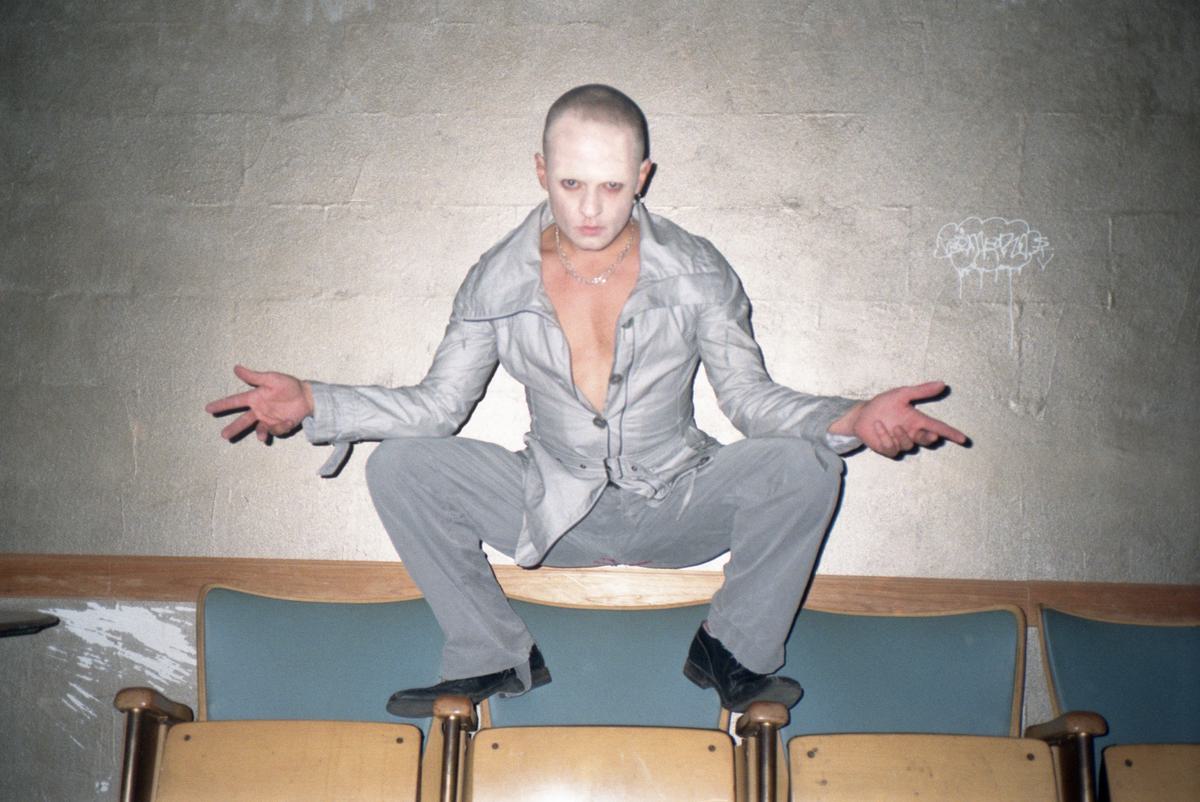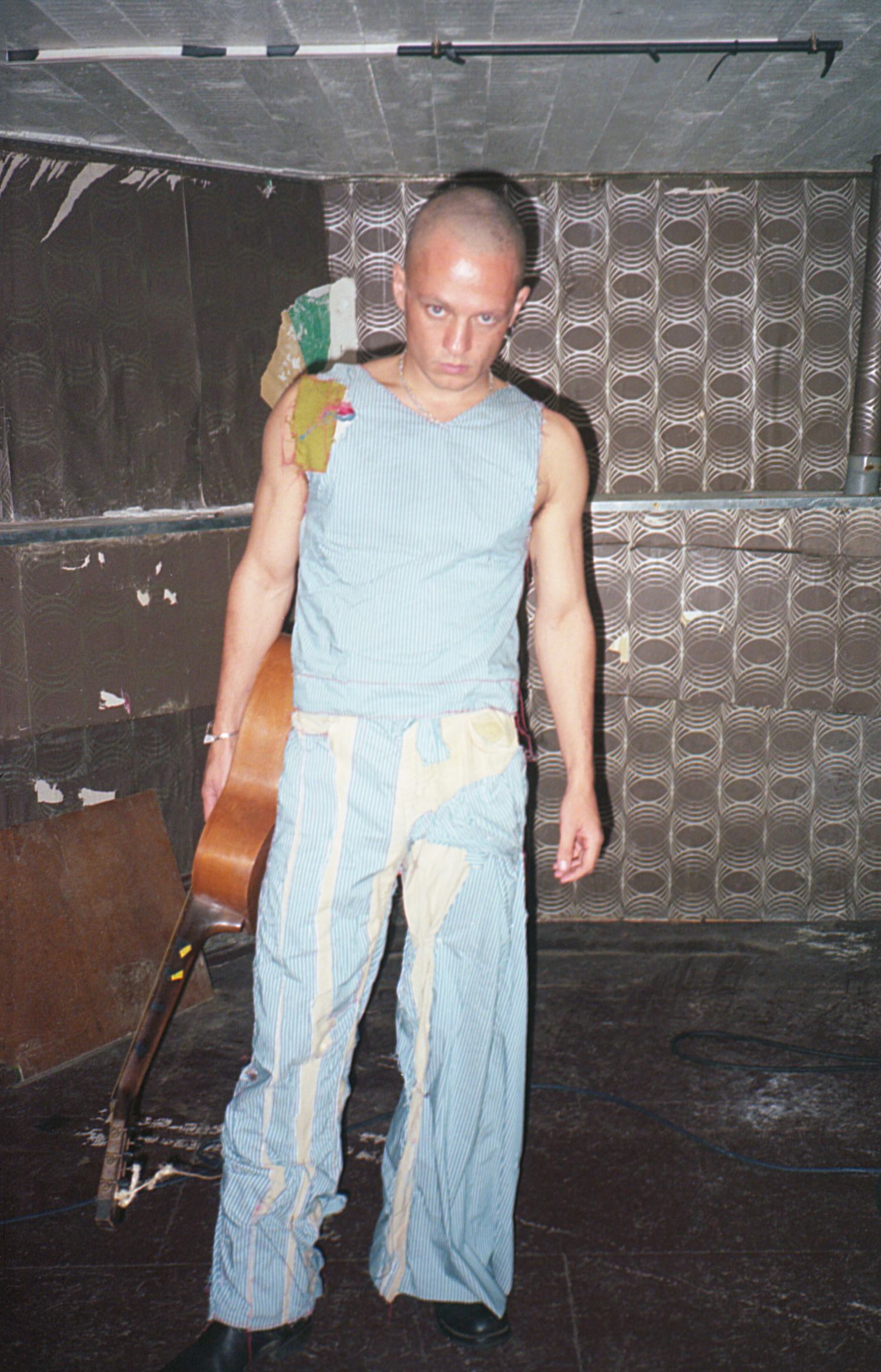
Loverman is on the rise
As Loverman, genre-agnostic artist James De Graef is bringing classical elements together with a tinge of jazz, theatrical performance, and a punk-as-fuck attitude.
Music has always been a path James De Graef was destined to follow.
Born to an English mother and Belgian father, for all intents and purposes the late-twenties songwriter comes from a studiously musical family. His father is a music fanatic, De Graef tells me: “He used to be a punker back in his day, so I got loads of post-punk, punk, dub influences from him. Even when I was in high school, he would still feed me new music that was appearing all the time. He was constantly buying CDs, and I had a cherry-pick from whatever he'd had on offer.”
A multi-instrumentalist, his mother imposed the recorder on De Graef and his siblings from a young age, and in true English fashion, “I still have vivid memories of messing up and intense experiences,” he chuckles. From here he began participating in Belgian brass bands playing the euphonium and developing his musical vocabulary: "It's funny because it's so naff, it's so uncool, and it's so rigid, but it's ingrained in me," he explains.
Once De Graef hit his teens, he followed a well-worn path: joining bands, getting into heavy metal, and eventually drumming (“It's fun to do heavy metal when you're a drummer”). Next up, was electronic music and dubstep as he reached high school, and here he began toying with writing music. Inspired by James Blake, his forays into production alongside songwriting and singing laid the foundation for his future as a solo artist. But first, he had a cultural hump to ascend: “It's quite embarrassing to sing if you're in Belgium," he explains. "People are very reserved and awkward with their selves and their bodies, and there's a lot of shame around it. If you start singing, people already think you're a big weirdo, but I always felt that inside, as I said, I've always had the English and the Belgium in me.”

Heading to study music – simply because he didn’t know what else he wanted to do – De Graef enrolled at LIPA and eventually formed a band – the genre-twisting rockers Shht – where De Graef would spend a chunk of his twenties until the pandemic put pay to any progress. “We released an album the week the lockdown was announced, so all our plans were gone. And I remember it feeling like a huge relief, because I was starting to feel a bit confined in the project I was in, and I felt just the need for self-expression.”
Developing as an artist is De main Graef’s focus. While he doesn’t profess to be a student of the craft, flowing from genres, dabbling in production, and figuring out the ins and outs, is key to his self-expression. "For the most part, I was mostly obsessed with form, I used to be one of those people that wouldn't listen to lyrics. I was just interested in sounds, and I've explored the avenue of sounds intensely,” he tells me. The one thing that has remained is the entertainment aspect of being an artist: "I just love being on stage. It's like a second nature."
While Shht was his predominant musical output, he also embarked upon a project alongside his then-girlfriend called Partners. It was the dissolution of this project and relationship that led to Loverman, and last year's debut album Lovesongs. Hauntingly crooning his way around the halls of a past relationship, the record's songs are gentle, and brooding, relying more on the cinematic lusciousness of a soundscape to give the emotion as much as a jazz drum ratatats solemnly, or a piano deftly waltzes around the heartbreak and reckoning of loves past.
Embarking on this solo adventure, and branding himself as Loverman was a natural move. “It just came out of thin air... I think I was just walking, walking, and then the name popped in my head, and I was like, 'if I ever do a solo thing that that that could work,' that I wouldn't mind calling myself that.”
Similarly, a spontaneous process was bringing his debut album out into the world, according to De Graef. “It was my first real effort at songwriting," he tells me. "I'd written songs before, but nothing that I feel like, Okay, this is worth following through. But then all of a sudden, I just had this body of work. It was a combination of all the things that come before.”
While Loverman would eventually became an entity of its own, it took time for De Graef to find his feet. "In the beginning I could get insecure about my intuition because I'd studied music, and then the things I've been doing intuitively seemed very simple and basic and naive compared to what I've been studying," he explains. "But, the more I realise that that's the good stuff, basically. That's what sticks at the end of the day.”
De Graef sees himself somewhere between an artist and a writer: “I'd almost say that I'm a very good performing artist and a hobby writer," he says, "but that hobby part is also the interesting part."

Loverman has toured extensively over the last year, partly thanks to the opportunities opened up by the European Talent Exchange (ETE). The platform helps European artists get on lineups across Europe and beyond, representing 130 partner festivals. Since 2003 the ETE has in fact helped almost 3000 artists to play 5676 shows across 44 countries. With the systems all working in tandem to make booking and playing shows seamless, De Graef has been able to rank in the top ten of artist bookings, with slots at the likes of Rock en Seine, Iceland Airwaves and Reeperbahn Festival.
This journey has, most importantly, aided in De Graef's growing confidence in himself as a solo artist: “When I decided to not play in the band projects anymore I suppose I felt quite insecure about myself, and I still do to this day," he admits. "But I feel there are certain things I have to prove to myself, and the only way of remedying my insecurities is by proving to myself what I want to be able to prove to myself. And playing solo was one of those things. It's got to do with autonomy.”
The learning curve between where De Graef is, and where he wants to be, is where he comes to life. "It is fun, and it is gruelling and torturous at times," he chuckles, "and painful.... but, at the end of the day, it makes me feel alive."
He's learning to thrive in the chaotic push and pull of comfort versus discomfort. Although that means his grander life plans may have to go on hold, including the romantic side. "I'm realising more and more that I'm not that easily content with life – that there's a lot I want from life – and it's frustrating at the same time, because that makes it hard to settle down as well," he tells me. "I guess those cards are just not yet on the table for me. I don't even have a choice, I get loads of satisfaction from doing the challenges.”
The deluxe edition of Loverman's debut Lovesongs and Some is out now. Who will be the next act with such a success story at ESNS 2025? Check out the full lineup.
Get the Best Fit take on the week in music direct to your inbox every Friday

Lorde
Virgin

OSKA
Refined Believer

Tropical F*ck Storm
Fairyland Codex





